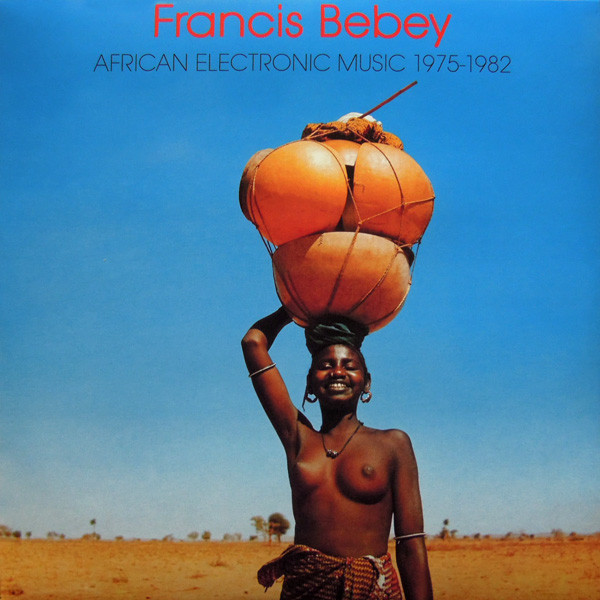
Music, of any form and kind, from distorted, aggressive stabs at electric guitars to the high-pitched ballads that beads on a string sing, no matter how meek or aggressive must submit to some form of classification. A group name to water down its oddity and mask its fragrance with something more familiar and relatable.
The listener is compelled to acquiesce to this regimentation and the artist is obliged to break this rigidity. Francis Bebey, in 14 tracks, does the latter as he attempts to challenge your understanding of the term African Electronic Music.
The Cameroonian multi-instrumentalist, singer, writer and composer throughout his prosperous career in numerous African countries endeavoured to apply the sound of the future, the synth and bass of electronic music he loved with the peculiar sounding and rhythmically rich songs and chants of the many diverse Africans he met on his travels across this dynamic continent. This compilation album represents the best products of his search to find the tangents between these two mediums that had never combined in such spectacular and ambitious style. The songs are pieced together from his over twenty-five solo albums to create a bold yet, cloudy mosaic personifying this novel genre of African music.
The predominantly instrumental music on his album African Electronic Music (1975-1982) is captivating. The Kora, pygmy flute, harp zither and other indigenous African instruments confidently lead the electric guitar, disco synths and late 1970s electronic drums robotic programming to produce a distinct, obscure and warm atmosphere that arrests the attention of any listener throughout the LP. The fragile and brittle nature of the sounds go on to mirror the fragile intersections of contemporary African society like ethnicity, gender roles and economic inequality as most of the cuts are deep thought-provoking reflections of various facets of social life.

Song like the Coffee Cola Song and La Condition Masculine embody the thematic spirit of the artist and highlight why his songs are more than just loops of progressions from obscure synthesisers and futuristic midi controllers and pedals. His spoken verse on La Condition Masculine is a story of how the dynamic between the African man and woman keep changing as society’s ideas of gender roles disintegrate from their primitive forms. Beginning with a racy pygmy flute loop, Francis Bebey laments on people who “believe we are wild”on the uptempo, dance friendly Coffee Cola Song. The ironic synthpop number is a playful and witty indictment of the crime of colonialism . Probably the best song on this album, Tiers Monde, third world, showcases Bebey’s instrumental brilliance with his signature guitar progression leading the melody and countered with high-life style trumpet solo. The serenading zest of this calm song lingers long after it has stopped.
Bebey’s socially charged and melodically uplifting music is one of a kind and must be appreciated in the social and historical period in which it was composed. The nature of his composition and musical arrangements are important to observe when analysing how far African electronic music has grown as a genre. Although the music now tends to drift towards pop, electronic dance music, deep house and deserts blues or rock. It is amazing how this style of fusing western musical styles with our African flair has evolved, as with the serenading blues ballads from the desert bands like Terakaft and Tinariwen to the pulsating deep house cuts from South African duo, Liqiudeep and Kenya’s own Just a Band. All these artists’ ingenuity is the solid base for their brilliance as they do not aim to imitate but rather own and command their own voices. And today African electronic music exists in its most pristine form yet.
As a cohesive body of work, the tape blends perfectly and makes the listener appreciate this cryptic yet important marker in the history of contemporary African music. The only area in which it disappoints is that it does not allow you to appreciate the songs in the context in which they were originally recorded and arranged. This is because they were pulled together from different albums to complete this compilation; indeed this problem is symptomatic of this kind of album. However, on this tape, the effect is miniscule. It rather convinces the listener to delve deeper into this sound and discover more.

Francis Bebey’s rebellious and ingenious nature, completely disregarding pre existing rules of music where he grew up is what sets his music apart from all the other experimental records now lost to us, who charged after the quickening pace of technological advances . African Electronic Music (1975-1982) is a ravishing fire that manages to fit everything from lo-fi psychedelic pop, slippery blues, to charged dance numbers on this fourteen-track compilation, where every song has its one distinct taste. The music is not the cleanest sounding record but was miles ahead of its time and even today, it still is in a class of its own.
Listen to the music here
—
Written by Hakeem Adam
Photo Credit: Benoit Le Petit, Pierre René-Worms


1 Comment